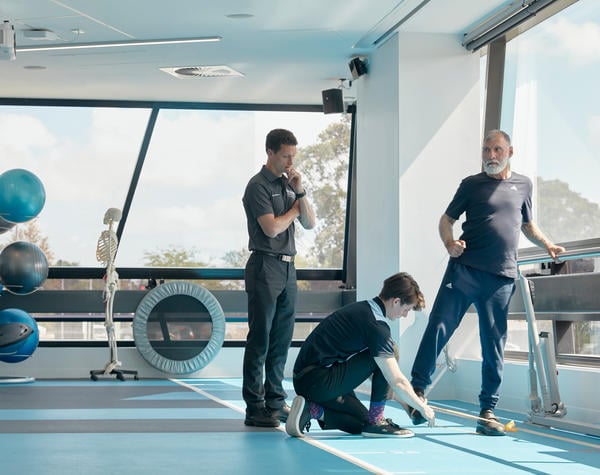The world's greatest athletes are typically surrounded by sport science professionals and experts to achieve consistent peak performance. Whether it’s the NBA, the AFL or the EPL, those involved in sport science are in steady demand.
However, it's not just elite athletes and high-performance sports that need exercise and sport science professionals. As the link between physical and mental wellbeing has become more evident, the demand for people who understand the science behind physical activity is continuing to grow.
Dr Kate Parker and Dr Shannon Sahlqvist, both Deakin academics working in Deakin University's School of Exercise and Nutrition Sciences, advocate for people to consider pursuing careers in physical activity and health.
Why are sport and physical activity important?
Physical activities, including sport, are crucial to the physical and mental health of individuals, and provides numerous benefits to the greater community.
Dr Parker says active participation in sport or other physical activity can help ward off many debilitating diseases and may also help develop an enjoyment of movement that lasts a lifetime.
'Sport can be viewed as a vehicle to increase physical activity which is essential for a healthy life and to reduce the risk of non-communicable diseases such as type 2 diabetes, overweight and obesity, cardiovascular disease, cancer, depression and anxiety,' Dr Parker explains.
For those who are not sport-inclined, Dr Sahlqvist says even participating in simple physical activities is beneficial to your overall health and wellbeing, as well as the planet.
'Even walking and cycling at a moderate pace as has been shown to be health-enhancing and is associated with a range of benefits,' Dr Sahlqvist says.
'Walking and cycling when done for transport, typically replaces a car journey and therefore also reduces air and noise pollution and improves the quality of urban life.'
What careers exist in exercise and sport science?
Although working alongside the world's greatest sports stars is one possible career path, the fundamentals of physical and mental wellbeing are central to everyone. This foundational knowledge is applicable to a wide range of domains, and therefore opens the door to a number of different career options.
Careers in exercise and sport science are broad and varied, and numerous opportunities exist in the industry. They range from exercise physiology and health promotion to sports nutrition and sports science and research.
'The field of exercise and sport science is constantly evolving as we learn more and adapt to an ever-changing world,' Dr Parker says.
As a lot of the positions in the field involve some level of interaction with people within the community, Dr Sahlqvist suggests a certain temperament is needed to be successful in the industry.
'I think a person suited to health promotion needs to have empathy and an ability to walk in someone else’s shoes,' Dr Sahlqvist says.
'They need to understand that health is complex, and it is not a matter of simply telling someone to improve their health.'
Real people, real problems
Some of the most significant issues facing people are a lack of regular physical activity and the maintenance of a healthy diet. Exercise and sport science industry professionals work with their clients to help them achieve a better quality of life.
Dr Sahlqvist says many different hurdles can cause people to feel like a healthier lifestyle is unachievable. But it can be easy to overcome.
'Finding 30 minutes to be physically active can be difficult for some people. We hear barriers such as cost, lack of time, lack of enjoyment, lack of skill, lack of social support and poor access to recreation facilities, to name a few,' Dr Sahlqvist says.
Those in the exercise and sport science industry work with individuals, communities and governments to provide ideas and solutions to encourage increased physical activity.
'Exercise science trained professionals working in public health roles are often involved in developing and implementing community-level programs that meet the needs of the user; advocating for and designing urban environments that support physical activity; counselling patients and developing local, state and federal policies that support walking and cycling' Dr Sahlqvist says.
How can someone prepare for this type of career?
If you’re wanting a career in the world of exercise and sports science, whether to help people stay physically active, or to help sports people achieve their goals, obtaining a relevant degree is key. Deakin University’s sport science school, which is first in Australia and number 1 in the world, offers many course options, whether you’re just starting out or changing careers from a different industry.
If you’re beginning at undergraduate level, you might consider a Bachelor of Exercise and Sport Science. Dr Parker says this program gives students a lot of variety and flexibility when it comes to choosing specialities and different pathways. 'With 11 different major streams available, including physical activity and health, sport coaching and exercise physiology, it really is a course for everyone.'
If you already have an undergraduate degree, you might want to widen your career prospects with the advanced skills you’ll gain in a Master of Applied Sport Science. If your bachelor degree is in an unrelated discipline, you just need two years’ work experience to apply.
For those looking for specialist skills in one area, or simply wanting a shorter qualification, the Graduate Certificate of Sport Performance Analysis, Graduate Certificate of Strength and Conditioning, and Graduate Diploma of Applied Sport Science are all industry-leading stand-alone courses that also lead directly into the masters.
Want to take your sport career to the next level? Study postgraduate sport science at Deakin.

